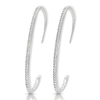Are Canadian Diamonds Really Ethical?
A generally accepted view is that any jewellery that has its components sourced responsibly and with transparency and that which is sustainable when it comes to environmental impact is considered an ETHICAL JEWELLERY.
Not, Let Us Pass the Diamond Jewellery Through the Test
When we prefix Jewellery with DIAMOND, the problem increases manifolds. Because of the involved profitability, diamond mining has continued to be a cause of civil wars and violence in the past and even today, it is responsible for the most reprehensible of the atrocities committed on the poor people whose lands are blessed with this precious stone, but all they get is forced labour, displacement and hunger..
It is an irony that the diamonds that are considered as “a symbol of love” and that which is touted as something that are “forever” are directly responsible for the death of over a million and displaced around 6 million people.
The awareness about the bloody diamond industry got an impetus with the release of Leonardo DiCaprio’s 2003 flick “Blood Diamond.” It was this movie that brought people face to face with the world behind the diamonds and it was not at all pleasing.
The movie showed the other side of the diamond industry and made many uncomfortable about the diamonds which is the most coveted possession for any woman.
Do You Think Blood Diamonds Are the Thing of the Past?
Technically, what we are getting today are not blood diamonds, but they are NOT AT ALL FREE FROM BLOOD STAINS.
It is true that certain steps from the International Community did lead to a little decline in the percentage of diamonds that were directly financing the civil wars in the African continent, yet, the overall impact was not much significant.
Though civil wars have become a thing of the past, yet the diamond trade is still wreaking havoc in the countries having diamond reserves underneath their soil. Many small scale diamond mines in Africa are either unregulated or partially regulated, which means they are potential zones of human exploitation in terms of forced labour, low wages, forceful displacement and destruction of animal habitat.
Ethical Sourcing is Just a Buzzword!
Human Rights Watch February 2018 report entitled “THE HIDDEN COST OF JEWELRY – Human Rights in Supply Chains and the Responsibility of Jewelry Companies,” sheds light on how the buzz about ethical sourcing is more of a hollow promise than a reality.
Why is this so? Well, to be very honest, the whole supply chain of diamonds right from its extraction to the time it reaches the retail market is complex (but that does not mean that it should become acceptable to have non-traceable diamonds).
Being extracted from the earth’s crusts in different parts of the world, the raw diamonds are then exported to other countries where they are processed, cut and polished, they then reach the manufacturing units where the skilled artisans convert them into beautiful jewellery pieces and then they typically reach the retail stores. By the time it becomes available for the customer, it becomes really difficult to identify whether any human rights violations have taken place in the entire supply chain or not.
The report mentions that some companies do have some checks and balances, but many simply rely on the assurances they get from the suppliers and do not have mechanisms in place to check from which mine their diamond has come from.
This means, a consumer can never be sure that the product one is wearing is free from negative energies and bad Karma or not.
Does Kimberley Certification Guarantee Ethical Diamonds?
Established in 2003 to prevent “conflict-diamonds” from entering the mainstream diamond trade of rough diamonds, KPCS (Kimberley Process Certification Scheme) came into existence from the resolution of the United Nations General Assembly.
Today, you can purchase Kimberley certified diamond jewellery that is expected to give you confidence that the diamond in your jewellery is conflict-free, but, UNFORTUNATELY, THIS MAY NOT BE TRUE.
Joanne Lebert, Executive Director of IMPACT, an organisation that has stayed with the KPCS since the very beginning said a few years ago,
“Consumers are being sold something that is not real…The Kimberley Process—and its Certificate—has lost its legitimacy. The internal controls that governments conform to do not provide the evidence of traceability and due diligence needed to ensure a clean, conflict-free, and legal diamond supply chain. Consumers have been given a false confidence about where their diamonds come from.”
Are Canadian Diamonds Really Ethical?
Do you believe Canadian diamonds pass the ethical test? The very reason they are sold at a higher price is because “Canadian Diamonds” are claimed to be the ethical choice which do not come with a baggage of negative energies and bad Karma and are not responsible for causing damage to the environment.
However, contrary to the claim, the famous Victor Mines in Canada have resulted in great devastation and damage to the entire ecosystem including destruction and obstruction to the animal habitats and their migratory routes.
Would You Buy a Diamond Jewellery If You Know a Child in Africa Picked It Up For You While Risking His Life?
Child labour is closely intertwined with diamond jewellery. Children are pivotal in mining diamonds from extremely constrained locations because of their size, as adults cannot go in. Children as young as 9 years work in the mines under the hazardous situations. Another reason why children are employed is because they are easy to be tamed and don’t demand higher pays compared to a full grown man. Zimbabwe is known to have quite a large number of children miners.
Besides, children prove to be really efficient in cutting and polishing the diamonds because of their little hands. Hence, mostly, across the globe, they are employed in doing this job. India is known across the world for rampant child labour, specifically in the diamond industry.
Seeing a worker working in a mine, particularly a diamond miner, it would not be difficult to comprehend what he/she goes through. They go inside the mining pits that are filled with harmful mineral waste, without any safety gears. The working conditions are subhuman and they have no other option but to endanger their lives in order to feed their families.
If a miner falls ill, it often means that his family will go without food that day or the number of days he/she has not worked.
Most of the mines are unregulated, hence the mining work becomes one of the worst forms of unorganised workforce, where the worker works without any rights or even basic moral considerations on the basis of being human.
Dove Diamond – A Guaranteed Conflict-Free and Slavery Free Diamond Jewellery
As all our diamonds are lab-grown DOVE DIAMOND, the issue of inhumane mining conditions, slavery and child labour gets eliminated automatically. When it comes to metals, we only use recycled metals that make zero contribution to mining.
In addition to it, our hand-made, minimalistic design jewellery helps create more fair price jobs.
This makes DOVE DIAMOND JEWELLERY A MORE HUMANISED BRAND!












